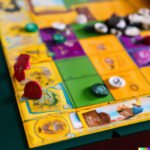Parcheesi is a classic board game that has been enjoyed by families and friends for generations. Understanding the classic parcheesi board game rules is essential to fully appreciate this timeless game. In this article, we will explore the history of Parcheesi and delve into the basics of the game, including step-by-step instructions for setting it up and playing by the traditional rules.
The origins of Parcheesi can be traced back to India, where it was known as “Pachisi” and played by members of royalty. Over time, the game made its way to other parts of the world, including North America and Europe, where it gained popularity as “Parcheesi”. Today, it remains a beloved pastime for people of all ages.
In this section, we will take a closer look at the history of Parcheesi, shedding light on its cultural significance and impact on leisure activities around the globe. From its humble beginnings to its enduring appeal in modern times, Parcheesi continues to captivate players with its blend of strategy and chance.
The Basics
Parcheesi is a classic board game that has been enjoyed by generations of players. It originated in India and was later modified and popularized in the United States. The game is played on a special board with a cross-shaped track, and it involves moving pieces around the board based on the roll of dice.
The classic Parcheesi board game includes a board with a circular track divided into four colored sections, home spaces, safety zones, and a middle area called the “castle.” Each player has four pieces or pawns, which they must move around the board to get all of them into their respective home space. The goal is to be the first player to move all of their pieces into their home space.
To play Parcheesi, players take turns rolling two dice to determine how many spaces they can move their pieces. They must strategically navigate around the board, carefully choosing which piece to move and how far to move it. Players can also use special moves such as “capturing” an opponent’s piece by landing on the same space as it.
Understanding the basic rules of Parcheesi is essential for enjoying this timeless game. With its simple yet engaging gameplay, Parcheesi continues to be a favorite choice for family game nights and social gatherings. Whether you are a beginner or an experienced player, grasping the fundamentals of classic Parcheesi board game rules will enhance your overall gaming experience and strategic abilities.
Setting Up the Game
Setting up the classic Parcheesi board game is a simple process that can be completed in just a few minutes. To begin, you will need the Parcheesi board, 16 pawns in four different colors (four of each color), and a standard six-sided die.
The first step in setting up the game is to unfold the Parcheesi board and place it on a flat surface in the center of the playing area. Each player should choose a color and place their four pawns in the corresponding colored starting area on the board.
Once the board is set up and all players have placed their pawns in the starting area, each player takes turns rolling the die to determine who goes first. The player with the highest roll goes first, and play continues clockwise from there.
| Number of Players | Start Space |
|---|---|
| 3-4 | Home space for each color |
| 2 | Home space for two colors |
After determining which player goes first, they roll the die and move one of their pawns out of their starting area and onto the designated “start” space. This process continues for each player until all pawns have left their respective starting areas, at which point regular gameplay begins.
Playing the Game
Parcheesi is a classic board game that has been enjoyed by players of all ages for decades. The game is easy to learn and play, making it a popular choice for family game nights and social gatherings. Understanding the classic Parcheesi board game rules is essential for enjoying a fun and fair game with friends and family.
To start with, each player needs to roll the dice to determine who goes first. The player who rolls the highest number gets to make the first move, and play proceeds in a clockwise direction from there. Players take turns rolling the dice and moving their pieces around the board based on the numbers rolled.
The main goal of Parcheesi is to move all four of your pieces around the board and into your home base before your opponents do. However, there are some specific rules that dictate how pieces can move and interact with each other on the board. For example, players must roll an exact number to move their piece into their home base, or else they must wait for another turn to try again.
Overall, understanding these classic Parcheesi board game rules is crucial for having an enjoyable gaming experience with friends and family. It’s a timeless game that offers hours of fun while also providing opportunities for strategic thinking and competitive gameplay. Whether you’re a seasoned veteran or new to the world of Parcheesi, following these rules will ensure a fair and exciting match every time you play.
Strategy and Tips for Winning
Understanding the Importance of Strategy
Winning at classic Parcheesi requires more than just luck – it also involves strategic thinking and planning. Players need to consider their moves carefully, anticipate their opponents’ actions, and make decisions that will maximize their chances of advancing their pieces while thwarting their opponents’ progress. It’s not just about rolling the dice; it’s about making the most out of each roll and positioning your pieces strategically on the board.
Tips for Success in Classic Parcheesi
One key strategy in winning at classic Parcheesi is to prioritize moving your pieces out of the starting area as quickly as possible. Once your pieces are out on the main board, they are less vulnerable to being sent back to the starting area by an opponent’s piece landing on the same space. At the same time, it’s important to try to engage your opponents’ pieces whenever possible to prevent them from advancing.
Another important tip is to use your dice rolls wisely. For example, if you have multiple pieces in play, consider spreading out your move so that you can cover more ground and be less susceptible to being taken down by an opponent’s piece. Additionally, while it may be tempting to rush a single piece towards home, it may be wiser to focus on getting multiple pieces safely onto the main board before attempting a home run.
Staying Flexible and Adaptive
As with any game, adaptability is crucial in Parcheesi. The best-laid plans can go awry due to unexpected rolls or opponent moves, so players need to be prepared to adjust their tactics on the fly.
It’s important not to get too fixated on a single strategy but instead keep an open mind and be ready to change course depending on how the game unfolds. By staying flexible and keeping an eye on both short-term and long-term goals, players can increase their chances of success in classic Parcheesi.
Variants of Parcheesi
Parcheesi, also known as Pachisi, is a classic board game that has been enjoyed by people all over the world for centuries. Over time, different versions and variants of the game have emerged, each with its own unique rules and features. These variants add an exciting twist to the traditional Parcheesi gameplay, offering players new challenges and experiences.
Here are some popular variants of Parcheesi that have gained popularity among board game enthusiasts:
- Sorry. Sliders: This variant combines the gameplay of Sorry. and shuffleboard, requiring players to slide their pawns across the board to reach the safety zone.
- Trouble: In this variant, players pop the dice in a plastic bubble to determine their moves, adding an element of suspense and unpredictability to the game.
- Ludo: A variant that is similar to Parcheesi but with some differences in rules and gameplay mechanics. Ludo is often played on a square board with colored squares instead of a cross-shaped board.
These variants offer a fresh take on the classic Parcheesi experience, allowing players to explore different challenges and strategies while still enjoying the timeless appeal of the original game. Whether it’s sliding pawns in Sorry.
Sliders or popping dice in Trouble, these variants keep the spirit of Parcheesi alive while introducing new elements for players to enjoy. Whether you’re a seasoned Parcheesi player or new to the game, trying out these variants can add excitement and variety to your gaming experience.
Parcheesi Etiquette
When playing the classic Parcheesi board game, it’s essential to adhere to certain etiquette to ensure a fun and fair gameplay experience for everyone involved. Following proper etiquette can help maintain a friendly and enjoyable atmosphere during the game. Here are some important do’s and don’ts to keep in mind when playing Parcheesi.
Do’s of Playing Parcheesi
One of the key do’s of playing Parcheesi is to always treat your fellow players with respect and courtesy. This means refraining from making derogatory comments or engaging in unsportsmanlike behavior during the game.
Additionally, it’s important to pay attention to the game and take your turns in a timely manner, respecting the time and investment of other players. Communication is also crucial – make sure to clearly communicate your moves and any special circumstances that may arise during the game.
Don’ts of Playing Parcheesi
On the flip side, there are certain behaviors that should be avoided when playing Parcheesi. It’s essential not to engage in any form of cheating, such as manipulating dice rolls or moving pieces illegally on the board. Additionally, avoid being overly competitive or aggressive towards other players, as this can create a negative gaming environment. Lastly, refrain from causing unnecessary disruptions or distractions during the game, as this can disrupt the flow and enjoyment for all players involved.
Overall, following proper Parcheesi etiquette is crucial for maintaining a positive gaming experience for all participants. By adhering to these do’s and don’ts, players can ensure a respectful and enjoyable gameplay environment while preserving the timeless appeal of this classic board game.
Conclusion
In conclusion, the classic Parcheesi board game has stood the test of time, captivating players for generations with its simple yet strategic gameplay. As we have explored the history, rules, and variations of this timeless game, it is evident that Parcheesi continues to hold a special place in the hearts of both casual gamers and dedicated enthusiasts.
Its enduring appeal lies in the perfect balance of luck and skill, making it a favorite pastime for family game nights or gatherings with friends.
The beauty of Parcheesi is that its rules are easy to understand, allowing players of all ages to join in on the fun. The thrill of making calculated moves while also relying on chance keeps the game exciting and engaging from start to finish. Whether playing with the traditional wooden board or a modern version with colorful plastic pieces, the essence of Parcheesi remains unchanged – bringing people together for an entertaining and memorable gaming experience.
As we continue to embrace the timeless appeal of classic Parcheesi, it is important to pass down the tradition of playing this beloved game to future generations. By introducing new players to the rules and strategies of Parcheesi, we can ensure that its legacy lives on for years to come. So gather your family and friends, set up the board, roll the dice, and enjoy countless hours of laughter and friendly competition with this classic board game.
Frequently Asked Questions
How Do You Play Classic Parcheesi?
Classic Parcheesi is played with two dice and 16 game pieces that players must move around the board. The goal is to move all pieces into the center “home” space before opponents.
What Are the Rules for the Game Parcheesi?
The rules of Parcheesi include rolling a six to move a piece out from the starting area, hopping over opponents’ pieces, and capturing opponents’ pieces by landing on them. Players must follow the designated path around the board.
How Do You Play Pachisi Step by Step?
To play Pachisi, each player takes turns rolling six or seven cowrie shells and moves their pieces according to the number rolled. The goal is similar to Parcheesi – get all your pieces to the center before your opponents while following specific rules for moving.

I love playing all kinds of games – from classics like Monopoly to modern favourites like Ticket to Ride.
I created this blog as a way to share my love of board games with others, and provide information on the latest releases and news in the industry.





